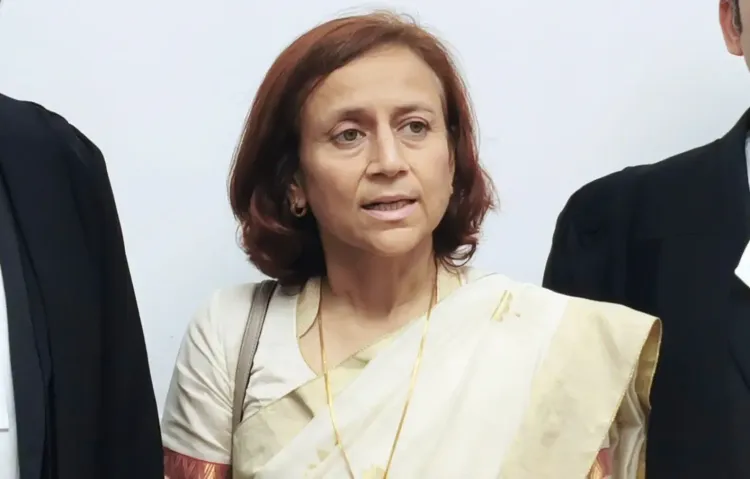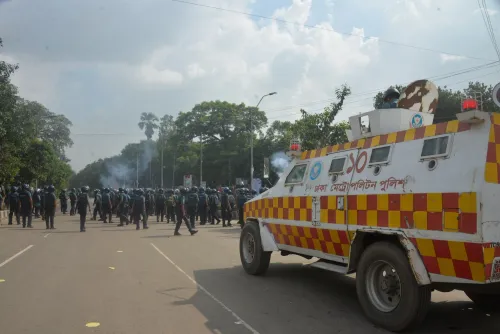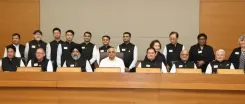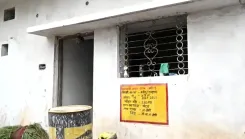Did the SC Allow Sonam Wangchuk’s Wife to Amend Her Plea Against His Detention?

Synopsis
Key Takeaways
- Supreme Court allows Gitanjali Angmo to amend her writ petition.
- Wangchuk's detention has raised questions about civil liberties.
- Concerns about sharing notes between detainee and wife acknowledged.
- Case scheduled for further hearing on October 29.
- Wangchuk recognized for contributions to education and environmental conservation.
New Delhi, Oct 15 (NationPress) The Supreme Court has granted permission to Gitanjali J. Angmo, the spouse of climate activist Sonam Wangchuk, to revise her writ petition that contests her husband's detention under the National Security Act (NSA).
A panel comprised of Justices Aravind Kumar and N.V. Anjaria acknowledged the argument from senior lawyer Kapil Sibal, who represented Angmo, stating that the petition needed revisions since the Central government had shared the grounds of detention with the detainee.
“I will amend the petition so that the matter can proceed here,” Sibal remarked, leading the apex court to schedule further proceedings for October 29.
The writ petition initiated by Angmo contests Wangchuk’s detention on the basis that the authorities had not disclosed the reasons for the detention, as mandated by Section 8 of the NSA. However, the Leh administration, in an affidavit submitted through District Magistrate Romil Singh Donk, asserted that the grounds had indeed been communicated to the detainee within the required timeframe.
The affidavit highlighted that Wangchuk and his family were informed of the detention and his transfer to Jodhpur Central Jail on the same day. “The authorities properly notified the wife of the detainee regarding the detention and the location of his custody,” the affidavit stated, further noting that a press announcement about the detention was released on September 26.
It also mentioned that the reasons for the detention were conveyed to Wangchuk on September 29, adhering to the five-day limit specified in Section 8 of the NSA, and that the detainee confirmed receipt with his signature.
During the proceedings, Sibal raised concerns that Wangchuk was being restricted from sharing specific notes he had prepared concerning his detention with his wife.
“He (Wangchuk) has created certain notes on the detention which he wishes to pass to his wife’s lawyer. Whatever notes he prepares, he has the right to legal assistance. Our request is simply to allow those notes to be shared,” Sibal argued.
In response, Solicitor General Tushar Mehta, representing the Union government, indicated that there was no objection from authorities regarding the sharing of notes with Wangchuk’s wife. “He has consulted with his lawyer twice. Furthermore, if he wishes to share notes with his wife, we have no issue,” SG Mehta stated.
Nevertheless, the law officer from the Centre expressed concern that such permission should not be exploited to establish new grounds for contestation, cautioning, “At times, even a delay of two days is cited as a basis for challenge. They might claim a delay in the right to representation. That is my concern. This should not be used as a basis for challenge.”
In its ruling, the Supreme Court refrained from commenting on the sharing of notes at this stage and instructed that the case be rescheduled for October 29.
The Union Ministry of Home Affairs attributed the incitement of violence in Leh town to Sonam Wangchuk. Wangchuk had been on a hunger strike since September 10, and upon the onset of violence in the town, he terminated his fast and fled the scene in an ambulance.
The activist was subsequently detained under the NSA and transported to Jodhpur Jail in Rajasthan.
Wangchuk is widely acknowledged for his contributions to education, environmental conservation, and various social causes. He has been a prominent advocate for educational reforms and sustainable development in Ladakh. Over the years, Wangchuk has gained both national and international accolades for his initiatives in creating affordable schooling models, promoting environmental protection, and fostering scientific innovation among students.









